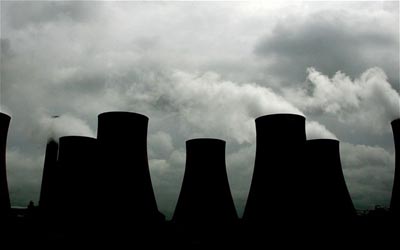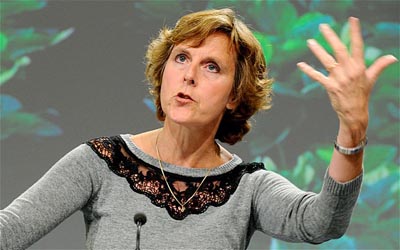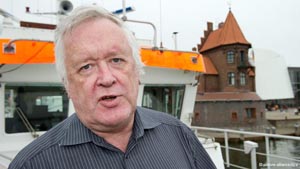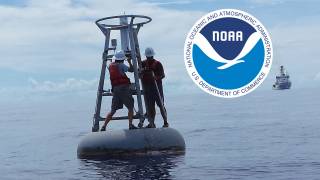Climate Scientists: We Might Have Been Wrong, But Pay Up Anyway!
Here are a few recent articles from various outlets on climate change (global warming? global cooling? cycles? human-caused?) which highlight the debate around the issue. The disconnect between the reality and message is head-shakingly bizarre.- It’s human driven. We’re 100% sure. Now we’re 95% sure. Do I hear 90?
- Ok, we’re not sure it’s human driven, but let’s plan for when it is. Pay exorbitant energy and fuel fees in the meantime!
- Sit in your tiny, cold, dark houses while we write and rewrite the IPCC reports to our liking from our well-lit mansions. We need private jets to get to climate-awareness fund-raising benefits. You’ll see from our PowerPoint presentations this is all very important and we are, too.
- No you may NOT see our climate models or how we came to these conclusions!
These following articles demonstrate that the prevailing winds seem to be changing. In fact, it seems like those who had a vested interest in human-driven climate change are panicking a little.
READ: Hack the Planet Now! - Britain’s Senior Scientist Pushes for GeoEngineering
The public knows now the issue is not as cut and dried as was touted in the last few decades, and are frustrated by the constantly-adapting fear mongering.
---
Top climate scientists admit global warming forecasts were wrong
By Hayley Dixon | The Telegraph
Top climate scientists have admitted that their global warming forecasts are wrong and world is not heating at the rate they claimed it was in a key report.

A leaked draft of a report by the UN Intergovernmental Panel on Climate Change is understood to concede that the computer predictions for global warming and the effects of carbon emissions have been proved to be inaccurate.
The report, to be published later this month, is a six year assessment which is seen as the gospel of climate science and is cited to justify fuel taxes and subsidies for renewable energy.
The “summary for policymakers” of the report, seen by the Mail on Sunday, states that the world is warming at a rate of 0.12C per decade since 1951, compared to a prediction of 0.13C per decade in their last assessment published in 2007.
Other admission in the latest document include that forecast computers may not have taken enough notice of natural variability in the climate, therefore exaggerating the effect of increased carbon emissions on world temperatures.
The governments which fund the IPCC have tabled 1,800 questions in relation to the report.
One of the central issues is believed to be why the IPCC failed to account for the “pause” in global warming, which they admit that they did not predict in their computer models. Since 1997, world average temperatures have not shown any statistically significant increase.
The summary also shows that scientist have now discovered that between 950 and 1250 AD, before the Industrial Revolution, parts of the world were as warm for decades at a time as they are now.
Despite a 2012 draft stating that the world is at it’s warmest for 1,300 years, the latest document states: “’Surface temperature reconstructions show multi-decadal intervals during the Medieval Climate Anomaly (950-1250) that were in some regions as warm as in the late 20th Century.”
The 2007 report included predictions of a decline in Antarctic sea ice, but the latest document does not explain why this year it is at a record high.
The 2013 report states: “’Most models simulate a small decreasing trend in Antarctic sea ice extent, in contrast to the small increasing trend in observations ...
“There is low confidence in the scientific understanding of the small observed increase in Antarctic sea ice extent.’
The 2007 forecast for more intense hurricanes has also been ignored in the new document after this year was one of the quietest hurricane seasons in history.
One of the report’s authors, Professor Myles Allen, the director of Oxford University’s Climate Research Network, has said that people should not look to the IPCC for a “bible” on climate change.
[...]
Despite the uncertainties and contradictions, the IPCC insists that it is more confident than ever – 95 per cent certain - that global warming is mainly human’s fault.
Next week 40 of the 250 authors who contributed to the report and representatives of most of the 195 governments that fund the IPCC will hold a meeting in Stockholm to discuss the finding to discuss any issues ahead of the publication. The body has insisted that this is not a crisis meeting but a pre-planned discussion.
Read the full article at: telegraph.co.uk
New science report debunks climate scare
From: CNW
UN has hidden research that shows that nature, not humanity, controls the climate
"As the science promoted by the United Nations Intergovernmental Panel on Climate Change (IPCC) falls into disrepute, reporters face a difficult decision," said Tom Harris, executive director of the Ottawa, Canada-based International Climate Science Coalition (ICSC). "Should they cover IPCC reports, the next of which will be issued on September 27th, as if there were no other reputable points of view? Or should they also seek out climate experts who disagree with the UN’s view that we will soon face a human-induced climate crisis?
"With today’s release of Climate Change Reconsidered II: Physical Science (CCR-II - see http://climatechangereconsidered.org/, a 1,200 page report of the Nongovernmental International Panel on Climate Change (NIPCC), it is now much easier for media to adopt the second more balanced approached," continued Harris. "Co-authored and co-edited by Dr. Craig Idso, Professor Robert Carter, and Professor S. Fred Singer who worked with a team of 44 other climate experts, this document cites more than 1,000 peer-reviewed scientific papers to show that the IPCC has ignored or misinterpreted much of the research that challenges the need for carbon dioxide (CO2) controls. In other words, the NIPCC report demonstrates that the science being relied upon by governments to create multi-billion dollar policies is almost certainly wrong."
Professor Carter, former head of the School of Earth Sciences at James Cook University, Australia, explained, "NIPCC’s CCR-II report uses layman’s language to present solid evidence that today’s climate changes are well within the bounds of natural variability. Real world observations tell us that the IPCC’s speculative computer models do not work, ice is not melting at an enhanced rate, sea-level rise is not accelerating, the frequency and intensity of extreme weather events is not increasing, and dangerous global warming is not occurring."
CCR-II Lead Author for the extreme weather chapter, Dr. Madhav Khandekar, agrees, "When the earth was generally cooling between 1945 and 1977, there were as many extreme weather events as there are now, but climate scientists did not attribute this to human activity. The perceived link between global warming and extreme weather is primarily due to greater media attention on violent weather today than in past decades. Earth’s climate is robust and is not being destabilized by human-added CO2."
Associate Professor of Resource and Environmental Geology and Geochemistry at the University of Oslo, Norway, Dr. Tom V. Segalstad, added, "CO2 is ’the gas of life’. The more CO2, the more life. More CO2 means we can feed more people on Earth. CO2 is contributing very little to the ’greenhouse effect’. Clouds have much more influence on temperature."
Segalstad, a CCR-II Contributing Author, also pointed out, "The ocean has a very large buffer capacity. Hence the pH of the ocean will not be significantly changed from the relatively small contribution of anthropogenic CO2."
NIPCC Chapter Lead Author, Dr. Anthony Lupo, Professor of Atmospheric Science at the University of Missouri, describes the new report as "the most comprehensive report yet on all the issues surrounding climate and climate change." Lupo worked on the climate models chapter about which he said, "It represents the problems and benefits of working with computer models as well as highlighting the current techniques, strategies, and shortcomings."
"There is a climate problem," Carter admits. "It is the natural climate-related events that exact very real human and environmental costs. Therefore, we must prepare for, and adapt to, all climate hazards when they happen. Spending billions of dollars on CO2 controls in a vain attempt to stop these events from occurring reduces the wealth of societies, and so our capacity to address these and other real world problems."
[...]
Read the full article at: newswire.ca
EU policy on climate change is right even if science was wrong, says commissioner
By Bruno Waterfield | The Telegraph
Regardless of whether or not scientists are wrong on global warming, the European Union is pursuing the correct energy policies even if they lead to higher prices, Europe’s climate commissioner has said.

Europe’s climate action commissioner Connie Hedegaard.
Connie Hedegaard’s comments come as the United Nations Intergovernmental Panel on Climate Change (IPCC) is expected to admit that previous scientific predictions for global warming and the effects of carbon emissions have been proved to be inaccurate.
In an interview with the Telegraph, Europe’s most senior climate change official argued that the current policies are the correct ones because a growing world population will put pressure on energy supplies regardless of the rate of global warming.
"I personally have a very pragmatic view.
"Say that 30 years from now, science came back and said, ’wow, we were mistaken then now we have some new information so we think it is something else’. In a world with nine billion people, even 10 billion at the middle of this century, where literally billions of global citizens will still have to get out of poverty and enter the consuming middle classes, don’t you think that anyway it makes a lot of sense to get more energy and resource efficient," she said.
"Let’s say that science, some decades from now, said ’we were wrong, it was not about climate’, would it not in any case have been good to do many of things you have to do in order to combat climate change?."
The Danish commissioner also rejected public complaints over increases in electricity prices to subsidise renewable energies, such as wind farms, as unrealistic because, she said, increased competition over diminishing energy resources such as oil and gas will lead to higher bills.
"I believe that in a world with still more people, wanting still more growth for good reasons, the demand for energy, raw materials and resources will increase and so, over time so, over time, will the prices," she said.
"I think we have to realise that in the world of the 21st century for us to have the cheapest possible energy is not the answer."
Mrs Hedegaard, and the European Commission, have not changed their position that the science that is currently used to justify EU climate change policy is "over 90 per cent" certain that global warming exists and that it is manmade.
However, EU and other policymakers are worried that the IPCC’s forthcoming admission, expected on Sep 27, that previous forecasts are wrong will damage the legitimacy of climate change policies, such as levies and fuel taxes on consumers to fund renewable energy.
[...]
Read the full article at: telegraph.co.uk
Scientists conclude humans key factor in global warming
By Matthew Doran | 7News
Their report, builds on work previously done by scientists in the United States and presents a clear pattern of warming in parts of the atmosphere that is indicative of a human effect.
The only Australian researcher who was part of the team, Professor Tom Wigley of Adelaide University, says it analysed satellite temperature data over 34 years.
He says the team showed there was no other way to explain climatic changes at various atmospheric levels.
Professor Wigley said by looking at temperature changes across atmospheric layers from the Earth’s surface to about 20 kilometres skyward the results show clear characteristics of human interference.
"If the sun were the cause of the changes then one would see warming at the surface and in the lower atmosphere and in the upper atmosphere and in fact what we see is the opposite," he said.
"We see warming at the surface and cooling in the upper atmosphere, so that immediately discounts the sun as a causal factor.
"One of the standard sceptic arguments is that all the observed changes are caused by natural variability and often supposed to be due to solar activity. What we have shown beyond a shadow of doubt is that the climate changes we are observing cannot be due to the sun or any other natural factors."
Professor Wigley said the scientific team had concluded there was simply no other way to explain the changes that had occurred since 1979 when weather satellites were introduced.
The team found human influences, primarily greenhouse gases and related pollutants such as sulfur dioxide emissions and gases, had affected the atmospheric concentrations of ozone.
Scientists said study was comprehensive
Professor Wigley said it was probably the most comprehensive study yet done to try to identify the human influence on climate.
"The main thing is that we can identify what is called a human fingerprint, or a distinctive pattern of change in the observational record, and that pattern is derived from climate modelling experiments," he said.
"We look at patterns of change that can be attributed to other things, such as changing output of the sun for example, and we show that those cannot be identified in the observational record.
"We can see the human fingerprint, we can’t see the fingerprint of any other cause, and so it’s pretty obvious that the only explanation is there’s been a very distinctive human influence on the patterns of climate change."
[...]
Read the full article at: au.news.yahoo.com
’Climate scientists too easily jump to conclusions’
By Judith Hartl | DW
 For the past 15 years global temparatures have stopped rising. Allegedly, it’s because the Pacific is cooling - but that reason doesn’t quite convince German climate researcher Hans von Storch.
For the past 15 years global temparatures have stopped rising. Allegedly, it’s because the Pacific is cooling - but that reason doesn’t quite convince German climate researcher Hans von Storch. DW: Over the past 15 years, global temperatures have not risen, although there’d been many estimates that they would. Now, US scientists have presented a surprising explanation: In the magazine "Nature," they suggest that the cool waters of the Pacific Ocean are responsible. Is that plausible?
Hans von Storch: It’s possible. When we calculate the average global temperature, we measure it near to the ground or the water surface. The air above the ocean is almost the same temperature as the water itself. So if this water would be relatively cool, then this would indeed have an impact on the average global temperature we measure.
Are you then convinced by the new study?
Whether I am convinced is a different story. I can only say: "Yes, it is possible." But of course then you’d have to ask: "Why is it that the ocean suddenly gets cooler?" But if we do assume that happened, then the explanation might make sense.
So the US scientists haven’t actually explained why the eastern Pacific suddenly got colder?
No, so far they haven’t. But what is clear is that we have indeed had very little warming over the past 15 years. And this development is different from what we had projected. If this was to continue and global temperatures basically did not rise at all, we’ll have a problem.
So would it be better to do away with such projections and estimates?
No. But it’s sound scientific practice that with every theory, you have to be ready to say: "If I observe this or that in the future, then I’ll have to draw the conclusion that my findings are incomplete, or not correct."
And this wasn’t the case with global warming?
No. Also the story we’re dealing with now, about the cooler eastern Pacific, is only being explained in retrospect - trying to explain why we haven’t have any warming over the past 15 years. But these sorts of explanations always have a somewhat stale taste to them. A better one would be to say: "Okay, it could be like this - we can’t rule this out - but there also could be other reasons."
[...]
Read the full article at: dw.de






















